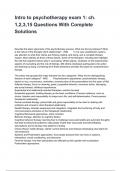Intro to psychotherapy exam 1: ch.
1,2,3,15 Questions With Complete
Solutions
Describe the basic opponents of the psychotherapy process. What are the key features? What
is the nature of the therapist client relationship? - ANS In my view, practitioners need to
pay attention to what their clients are thinking, feeling, and doing, and a complete therapy
system. Must address all three of these fascits. Some of the therapies, including here highlight
the role that cognitive factors play in counseling. Others places, emphasis on the experimental
aspects of counseling and the role of feelings. Still others emphasize putting plans into action
and learning by doing. Combining all of these dimension provides the bases for comprehensive
therapy.
The author has grouped the major theories into four categories. What are the distinguishing
features of each category? - ANS Psychodynamic approaches: psychoanalytic therapy,
based on incy, unconscious, motivation, reconstruction of the personalities (six first years of life)
Adlerian therapy: focus on meaning, goals, purposeful behavior, conscious action, belonging,
and social interest; childhood experiences
Experiential and relationship-oriented therapies- emotion focused
Existential approach: building therapy on the basic conditions of human existence, such as
choice, freedom and responsibility to shape one's life, and self-determination. Person-person
therapeutic relationship
Person-centered therapy: places faith and gives responsibility to the client in dealing with
problems and concerns; client-therapist relationship
Gestalt therapy: stresses awareness and integration; integrates the functioning of body and
mind and places emphasis on the therapeutic relationship
Cognitive Behavioral approaches- action oriented
Behavior therapy: attention to cognitive factors
Cognitive behavior therapy: learning how to challenge inaccurate beliefs and automatic thoughts
that lead to behavioral problems; help people modify their inaccurate and self-defeating
assumptions and to develop new patterns of acting
Choice theory/ reality therapy: clients' current behavior and stresses developing clear plans for
new behaviors
Systems and Postmodern approaches- how people produce their own lives in systems,
interactions, social conditioning, and discourse
Feminist therapy: how their personality was affected by their gender-role socialization
Postmodern approaches:
, Family systems therapy: understanding individuals in the context of the surroundings that
influence their development, culture, family, and other systems
What are the most pressing issues that Gwen presents in counseling? Describe her strengths
and relative weaknesses. Which of her concerns would you prioritize if you were her counselor?
What issues do you expect to be prominent in her treatment with Kellie Kirksey? - ANS
Gwen's problems: fibromyalgia, anxiety and depression, stress and isolation at job,
responsibility of family, sexually molested
Strengths: job, supportive husband, degree, church goer,
Weaknesses: no time for social life, long work hours, lacks confidence, doesn't finish projects
Concerns to prioritize: suicidal feelings, childhood trauma
Prominent issues: live a more balanced life, reduce stress levels
What are some of stans presenting problems? What are his areas of strength and weakness?
What issues do you expect to be prominent in his treatment with Jerry Corey? - ANS Stans
problems: alcoholic, doesn't get along with people, feels alone, lacks confidence, anxiety,
suicidal thoughts, feels like a failure, depressed, hopeless, rebellious childhood, fear of
initmacy/women,
Strengths: has a job in construction, college student,
Weaknesses: no social life, confidence,
In his treatment, issues that need to be solved is his feelings of suicidal thoughts, unworthiness,
stop the drinking, have a social/intimate relationship, anxiety and guilt
What is the value of personal therapy for the counselor? How does this process contribute to
the professional development of counselors? How do most counselors feel about this process? -
ANS Counselors should do some form of self-exploration to prepare in counseling others
90% of mental health professionals report satisfaction and positive outcomes from their own
counseling experiences
Personal therapy contributes to their professional work:
As part of their training, personal therapy offers a model of therapeutic practice in which the
trainee experiences the work of a more experiences therapist and learns what is helpful/ not
helpful
Further enhance a therapist's interpersonal skills that are essential to practicing therapy
Can contribute to a therapist's ability to deal with the ongoing stresses associated with clinical
work
Practitioners learn from their experiences; centrality of warmth, empathy, and personal
relationship; having a sense of what it's like to be a client; valuing patience and tolerance;
appreciating the importance of learning how to deal with transference and countertransference;
benefit by participating in personal therapy to understand how personal issues affect
professional work (healing the healer)
How might personal therapy help counseling students? What are the most important benefits of
personal therapy to counseling students? - ANS We gain an experiential frame of reference
with which to view ourselves; compassion for clients




